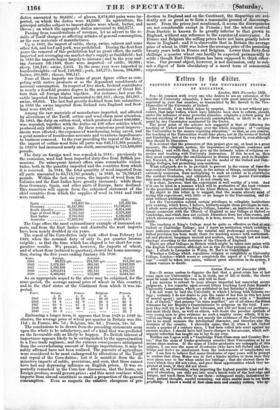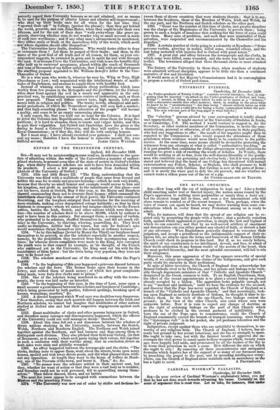Gattoss Tower, 3d December 1850.
but in no small measure the intellectual character, and therefore also the destinies of the country. I shrewdly, opine, that if, when I left Oxford nearly a quarter of a century since, I had been called into court against my ancient mother, I should have laid heavy charges to her account, which sub- sequent reflection has taught me to lay to my own.
Neither can I agree with a " Cambridge First-Class-man and Country Rec- tor," that the mass of Under-graduates consider their Universities as by no means dime matres. If the mass of Under-graduates are unhappily of this opinion, I am sure the mass of Graduates (who have left Oxford and Cam- bridge and derive no emolument from the endowments of benefactors) are
ot. I am fain to believe that many Graduates of riper years will be prompt to confess that Alma Mater was in fact a kinder mother to them than they were pious sons to her when under her tutelage ; that she showed them fa- vours which they did not value, and gave them opportunities which they ne- glected at least, if they did not abuse. After all, an University, when imparting the highest possible kind and de- gree of education, can only put into men's hands tools of the best edge and temper, and te,ach them how to use them : subsequent study, industrious la- bour, patient thought, careful reasoning, can alone enable men to use them profitably. I know a world of first-class-men and country rectors, who ap- Sue—It seems useless to disguise the fact that a great crisis has at last come upon our Universities it is, in truth, one of life or death ; the choice must be made between the two, and will be final. I am anxious to submit to your always impartial but somewhat severe judgment, a few remarks upon several letters touching Lord John Russell's University Commission, which are published in last Saturday's Spectator. I do not want to load the University to which I belong with fulsome eu- logy; certainly I do not desire to join the ranks of her foes in this her hour of mortal agony; nevertheless, it is difficult to assume with a " Resident B.A. of Oxford," that persons "in statu pupillari" are of all others the fittest witnesses for her Majesty's Commissioners to subpoena on the trial. I sus- pect they will try to get the best witnesses, and will not hunt out partisans ; and most likely they,. as well as others, will doubt the peculiar aptitude of very young men to give evidence in such a mighty cause, which, if it in- volves anything at all, involves not merely the existence of the Universities, but in no small measure the intellectual character, and therefore also the destinies of the country. I shrewdly, opine, that if, when I left Oxford nearly a quarter of a century since, I had been called into court against my ancient mother, I should have laid heavy charges to her account, which sub- sequent reflection has taught me to lay to my own.
Neither can I agree with a " Cambridge First-Class-man and Country Rec- tor," that the mass of Under-graduates consider their Universities as by no means dime matres. If the mass of Under-graduates are unhappily of this opinion, I am sure the mass of Graduates (who have left Oxford and Cam- bridge and derive no emolument from the endowments of benefactors) are
ot. I am fain to believe that many Graduates of riper years will be prompt to confess that Alma Mater was in fact a kinder mother to them than they were pious sons to her when under her tutelage ; that she showed them fa- vours which they did not value, and gave them opportunities which they ne- glected at least, if they did not abuse. After all, an University, when imparting the highest possible kind and de- gree of education, can only put into men's hands tools of the best edge and temper, and te,ach them how to use them : subsequent study, industrious la- bour, patient thought, careful reasoning, can alone enable men to use them profitably. I know a world of first-class-men and country rectors, who ap-
parently re their University honours as an end attained, not as means to be used or the purpose of ulterior labour and ulterior self-improvement ; who shut up their books once for all when for the last time they sported their oak " in College, (pardon the phrase) ; then they get behind ▪ the world, grumble, and rate Alma Mater, when they ought to rate their own ▪ • idleness, and for the rest of their days " walk everywhere like grave pa-
geants, observing whether men do not wonder why so small account is made 11- of such rare worthiness ; and if any other man's advancement be mentioned,
they either smile or blush at the marvellous folly of the world, which seeth e not where dignities should offer themselves."
The Universities have faults, doubtless. Who would desire either to deny uor extenuate them ? Let them be purged of their faults ; and then, in the name of the good God of all truth and of all reason, let them, as lour cor- I'' respondent suggests, be extended in germ and in spirit far and wide through - the land. It is because I love the Universities, and wish to see the benefits they offer held up to universal acceptance, placed within .the reach of thousands and tens of thousands of my fellow-subjects, that I hail with peculiar pleasure the startling proposal appended to Mr. William Sewell's letter to the Vice- Chancellor of Oxford.
He is a wise man who wrote it, whoever he may be, Whig or Tory, High Churchman or Low ; well aeq.uamted with the intellectual wants of multi- tudes of Englishmen, and anxious to supply them with healthy food. Instead of whining about the nauseous cheap publications which issue weekly from low presses in the Metropolis and the provinces, let the Univer- sities show front against the evil in a manly and apparently in the only practical way, by establishing numerous centres of instruction, such as those now proposed. These will diffuse correct taste, MwSs morals, lofty senti- ments both in religion and politics. The trashy mete atheistical and anti- social periodicals, of which Mr. Tremenheer speaks, • soon rack a market; mid that high-sounding phrase " the education of the people" Will become a reality, and cease to be an empty unmeaning phrase. I only regret, Sir, that you hold out no hope for the Colonies. It is hard to drive the Colonies into Bspublicanism, and then abuse them for being Re- publican ; it is hard to abandon them to coarse and vulgar habits, and then to quiz their vulgarities. Let Oxford and Cambridge have the grace or the daring to found a Colonial University, and they will outlive a thousand Royal Commissions ; or if they die, they will die with undying honour.
But I must stop ; I have already exceeded your patience. I shall not con- teal my name ; therefore I have the honour to subscribe myself, Sir, your

























 Previous page
Previous page